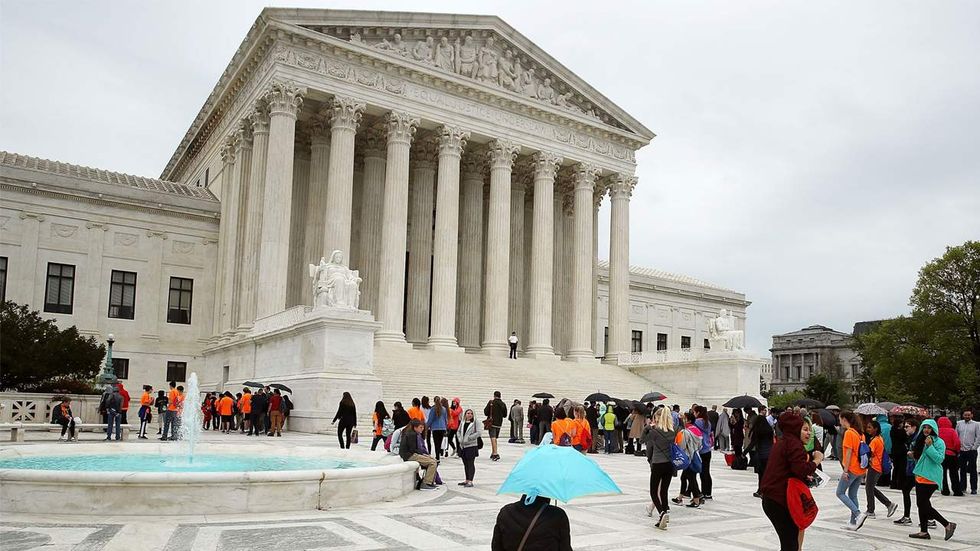
The U.S. Supreme Court's June 16, 2017, decision in Trinity Lutheran Church v. Comer could dramatically alter the school-choice debate.

On June 26, the U.S. Supreme Court ruled in a 7-2 decision a private Christian school operated by Trinity Lutheran Church in Missouri is eligible to apply for and receive public funds offered by the state to rubberize playgrounds, despite a section of the state’s constitution that forbids the use of public funds to aid private religious institutions.
The importance of the case (Trinity Lutheran Church v. Comer) is immense for a number of reasons, but one of the most far-reaching is the impact it is expected to have on school-choice programs. Throughout the country, the popularity of school choice has been growing substantially. One of the most effective school-choice policies — and the one that is championed by many of the leading voices in the school-choice movement — is education savings accounts.
Unlike charter schools, ESAs allow parents to use public funds to pay for a wide array of educational options, including school books, homeschooling expenses and tuition at private schools, including private religious schools. ESAs provide the maximum amount of flexibility for parents, but in many states, lawmakers have been cautious about implementing these programs. While the reasoning for this might vary from state to state, one of the most important roadblocks to school-choice programs, especially ESAs, is the presence of so-called Blaine amendments.
Blaine amendments are 19th century state constitutional provisions that do not allow public funds to go directly to religious institutions for any purpose, including education. They were initially passed in large part to prevent Roman Catholics from using public funds to provide their children with a distinctively Catholic education. Thirty-eight states currently have Blaine amendments in their constitutions.
Because Blaine amendments present a significant challenge to school choice, these provisions have been heavily supported by teachers unions and other opponents of school-choice programs. In Nevada, the American Civil Liberties Union and teachers unions used the state’s Blaine amendment to effectively halt the state’s universal ESA program, perhaps the most advanced school-choice policy passed in recent U.S. history.
In the Supreme Court’s recent decision, it declared illegal Missouri’s choice to prevent Trinity Lutheran from having access to public funds on the basis of its religious affiliation, with Chief Justice John Roberts writing in the majority opinion, “[T]he exclusion of Trinity Lutheran from a public benefit for which it is otherwise qualified, solely because it is a church, is odious to our Constitution … and cannot stand.”
This remarkable statement seems to effectively strike down any law or decision from a state government that treats religious schools differently simply because they are religious, thereby neutering states’ Blaine amendments and providing school-choice proponents with a tremendous opportunity to advance liberty in education.
However, teachers unions and others are already saying one footnote in the Supreme Court’s ruling should derail school-choice supporters’ hopes. In the footnote, which was not attributed to anyone, the unnamed justice wrote, “This case involves express discrimination based on religious identity with respect to playground resurfacing. We do not address religious uses of funding or other forms of discrimination.”
According to Randi Weingarten, the president of the American Federation of Teachers, this note clarifies Roberts’ strong statement about the “odious” nature of preventing religious institutions from receiving public funds and limits the scope of the decision dramatically.
"This decision was about providing a generally available benefit to a church that was not going to be used for religious purposes and would not violate the establishment clause of the First Amendment,” Weingarten said, according to a report by Fox News. “That is consistent with the Blaine amendment, which was never intended to prevent religious organizations from receiving funding for uses that are open to all and do not promote religion or discriminate. Therefore, the Supreme Court's Trinity decision cannot be read as opening the door for states to promote religion or expand vouchers."
However, contrary to Weingarten’s assertion, the Supreme Court appears to be taking its own ruling much more broadly than teachers’ unions would like. Since handing down its decision in the Trinity case, the U.S. Supreme Court has declared the Colorado Supreme Court should reconsider a decision it handed down in 2015 that determined a school voucher program was unconstitutional because it allowed taxpayers to use the funds at religious schools. If Weingarten is correct and the Trinity decision was meant to be applied narrowly, this decision by the Supreme Court makes little sense.
It’s not clear whether the Court will broadly apply the Trinity decision, but if it does, as its early actions suggest, it could fundamentally change U.S. education, freeing all states to implement school-choice programs that could eventually replace the current, failing public-school model.
Justin Haskins